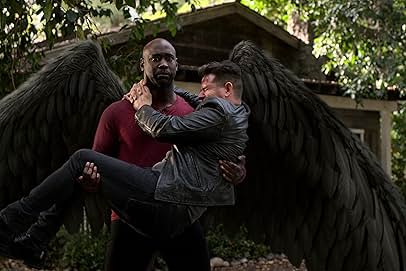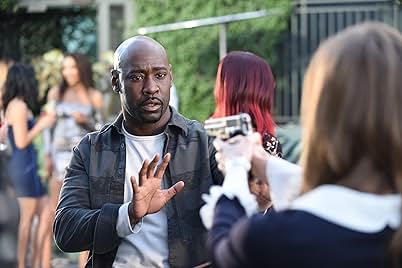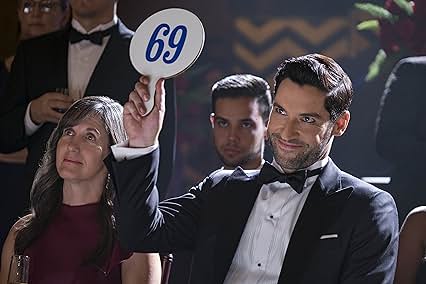The Lucifer review reveals why this 2016 Fox supernatural drama delivers genuine charm and unexpected emotional depth. Tom Kapinos’s focused direction transforms familiar procedural territory into something genuinely entertaining and emotionally resonant.
What happens when you combine the ultimate supernatural being with the most mundane aspects of police work? You get procedural perfection. Lucifer (2016), created by Tom Kapinos, stands as one of the most charming and unexpectedly heartfelt supernatural dramas in recent television history. This captivating series follows the Devil himself as he abandons Hell to run a nightclub in Los Angeles and becomes involved with the LAPD. While the show operates on familiar police procedural territory, it succeeds because it never takes itself too seriously—every moment of crime-solving and character development is handled with complete wit and emotional authenticity.

Synopsis
Lucifer Morningstar abandons his throne as ruler of Hell and relocates to Los Angeles, where he opens an upscale nightclub called Lux. When a pop star is murdered outside his club, Lucifer becomes fascinated by LAPD detective Chloe Decker, the only person seemingly immune to his supernatural charm and powers of persuasion.
Intrigued by this anomaly and bored with his immortal existence, Lucifer begins consulting with the LAPD on various murder cases. The series follows his unlikely partnership with the pragmatic Detective Decker as they solve crimes while Lucifer grapples with questions about redemption, family, and what it truly means to choose between good and evil.

Plot & Themes
Lucifer operates on a deceptively complex premise: sometimes the most profound questions about morality and redemption come from the most unlikely sources. The procedural setting serves as both entertainment framework and vehicle for exploring deeper questions about free will, punishment, and the possibility of change.
The series’ genius lies in its careful balance between supernatural elements and grounded police work. When Lucifer uses his ability to draw out people’s deepest desires to solve cases, the show never treats the investigative process as secondary to the supernatural spectacle. These moments work because Kapinos understands that true engagement comes from character development rooted in recognizable human emotions.
Thematically, the show explores how past actions define identity, whether people can truly change, and how relationships force even immortal beings to confront their deepest fears. Lucifer’s journey isn’t just about solving crimes—it’s about discovering that caring for others might be more terrifying than ruling Hell.

Cinematography & Visuals
The cinematography captures the glamorous darkness of Los Angeles nightlife with visual techniques that serve both the supernatural and procedural elements perfectly. The visual style emphasizes the contrast between Lucifer’s opulent club environment and the gritty reality of police work, using warm lighting and sleek production design to create an atmosphere that feels both otherworldly and grounded.
The series excels in building character relationships through visual storytelling. The sequences showing Lucifer and Chloe’s growing partnership demonstrate excellent use of both intimate conversation scenes and dynamic action sequences. The camera work holds on meaningful moments of revelation and connection just long enough to create genuine emotional investment.
Supernatural details reward careful viewing. During interrogation and revelation sequences, attentive viewers will notice how Lucifer’s powers manifest differently depending on his emotional state and relationship with the person he’s questioning.
Acting & Characters
Tom Ellis delivers a star-making performance as Lucifer Morningstar, anchoring the series with his portrayal of an ancient being discovering unexpected humanity through earthly connections. His character arc from selfish immortal to someone capable of genuine care feels authentic and earned rather than forced.
Lauren German provides excellent support as Detective Chloe Decker, bringing both professional competence and emotional vulnerability to her role. Her chemistry with Ellis creates a believable partnership that grounds the supernatural elements in recognizable relationship dynamics.
Kevin Alejandro rounds out the core team with a performance as Detective Dan that balances skepticism with growing acceptance of the impossible. His scenes during the most emotionally charged moments demonstrate genuine concern while maintaining character consistency.
D.B. Woodside and Lesley-Ann Brandt bring complexity to their roles as celestial beings, avoiding simple good-and-evil stereotypes while creating believable supernatural family dynamics.
Direction & Screenplay
Tom Kapinos’s creative direction maintains perfect balance throughout the series’ runtime. Coming from his experience with character-driven television, Kapinos understood that supernatural procedurals require careful pacing that builds both case resolution and character development. Every revelation and emotional beat is given space to resonate without overwhelming the procedural structure.
The screenplay layers development at multiple levels:
- Case-of-the-week stories that explore different aspects of human nature
- Supernatural mythology that builds naturally from character relationships
- Procedural elements that feel researched rather than perfunctory
- Emotional beats that emerge organically from character growth
The script’s structure follows procedural conventions while subverting them through supernatural insights. This creates familiarity that makes the unexpected moments of emotional revelation land with greater impact.
Sound & Music
The series’ score perfectly balances supernatural grandeur with intimate character moments to create an audio landscape that mirrors Lucifer’s journey from detachment to emotional investment. The music enhances rather than overwhelms the natural chemistry between characters and the tension of criminal investigations.
Sound design plays a crucial role in establishing the show’s unique tone. The way supernatural powers sound subtle rather than overwhelming, how nightclub atmosphere contrasts with police station environments, and the integration of contemporary music creates an immersive experience that places viewers directly into Lucifer’s divided world.
The use of popular music deserves particular recognition. Key emotional moments are enhanced by carefully chosen songs that reflect character development without feeling manipulative, trusting audiences to connect with the emotions through both performance and musical storytelling.
Conclusion & Verdict
Lucifer succeeds because it treats its supernatural premise with both humor and emotional intelligence that serves character development and procedural storytelling without sacrificing either. Every element—from performance to cinematography to sound design—works in service of both entertainment and genuine character growth.
Strengths:
- Tom Ellis’s charismatic performance that makes the Devil surprisingly sympathetic
- Strong procedural framework that supports rather than competes with supernatural elements
- Excellent character chemistry that creates believable relationships across supernatural divides
- Thoughtful exploration of redemption themes through both cases and personal storylines
Minor Weaknesses:
- Some procedural elements feel slightly formulaic compared to character development
- Occasional pacing issues when supernatural mythology overshadows case resolution
This series remains essential viewing for supernatural drama fans and anyone who appreciates character-driven procedurals. Lucifer works for audiences who enjoyed Constantine, Supernatural, or Castle.
Rating: 8.5/10
TV Rating: TV-14 (for violence, suggestive content, language, and supernatural themes)
Creator: Tom Kapinos
Starring: Tom Ellis, Lauren German, Kevin Alejandro, D.B. Woodside, Lesley-Ann Brandt
For more supernatural reviews, check out our analysis of other Fox original series. You can also explore the series’ production details at the Internet Movie Database.


